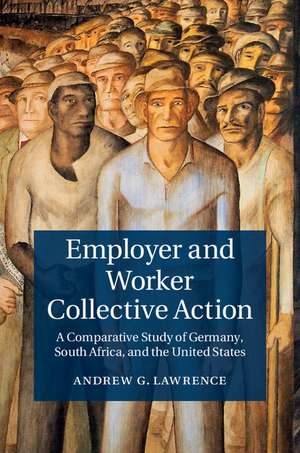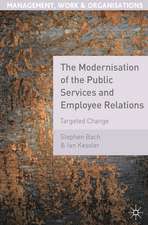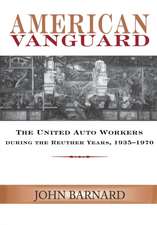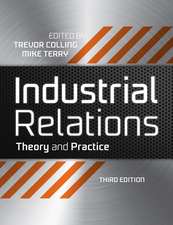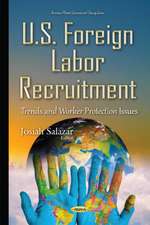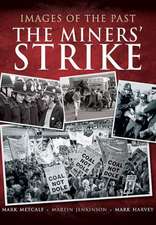Employer and Worker Collective Action: A Comparative Study of Germany, South Africa, and the United States
Autor Andrew G. Lawrenceen Limba Engleză Hardback – 10 aug 2014
Preț: 755.87 lei
Preț vechi: 878.92 lei
-14% Nou
Puncte Express: 1134
Preț estimativ în valută:
144.65€ • 150.10$ • 120.90£
144.65€ • 150.10$ • 120.90£
Carte tipărită la comandă
Livrare economică 17-31 martie
Preluare comenzi: 021 569.72.76
Specificații
ISBN-13: 9781107071759
ISBN-10: 1107071755
Pagini: 360
Ilustrații: 3 b/w illus. 12 tables
Dimensiuni: 157 x 236 x 27 mm
Greutate: 0.64 kg
Ediția:New.
Editura: Cambridge University Press
Colecția Cambridge University Press
Locul publicării:New York, United States
ISBN-10: 1107071755
Pagini: 360
Ilustrații: 3 b/w illus. 12 tables
Dimensiuni: 157 x 236 x 27 mm
Greutate: 0.64 kg
Ediția:New.
Editura: Cambridge University Press
Colecția Cambridge University Press
Locul publicării:New York, United States
Cuprins
Part I. Power in Theory and Context: 1. Contending theories of labor power; 2. Contextualizing workers' power; Part II. Employer Strategy and Collective Action: 3. Varieties of firm strategy: monopolization, cartelization, and concentration; 4. Varieties of employer associations: origins, development, and divergence; Part III. Workers: Outlaws, in the Law and by the Law: 5. Failed incorporation and union response; 6. Varieties of juridification; Part IV. From Postwar Golden Quarter Century to Post-Cold War Interlude: 7. The golden quarter century: revival, containment, or decline?; 8. Union and employer relations after the golden quarter century; Part V. Collective Action before and in the Global Economic Crisis: 9. From tripartism to global crisis; 10. Conclusion: doing the work of crisis without crisis?
Recenzii
'What unions can do in theory, versus what they can achieve in practice, varies too widely to be accounted for by institutional variables alone. Andrew Lawrence's theoretically sophisticated and empirically rich study of unions and employers organizations in the United States, Germany, and South Africa shows us how labor power is a relational rather than a structural property that allows the translation of resources from one domain to another. Ability and agency, rather than capacity or density, are the keys to understanding the diverse patterns of workers' collective action.' Mark Blyth, Brown University
'Employer and Worker Collective Action is a trailblazing analysis of how interrelationships among capital, labor, and the state have shaped the distinctive trajectories of the political economies of Germany, South Africa, and the United States. Further, Lawrence's claims regarding the forces, relationships, and politics of the capitalist mode(s) of production have relevance far beyond the three cases; they promise to influence future research agendas in sociology, political science and political economy.' Mark Kesselman, Columbia University
'Andrew Lawrence's Employer and Worker Collective Action steps boldly outside the norm in political science, examining a truly important question from a unique vantage point. Lawrence's analysis of the politics of labor markets and movements in both the developed and developing worlds is theoretically sophisticated, rigorously detailed, and genuinely pathbreaking. It contains invaluable resources for anyone hoping to understand labor politics in today's world.' Jason C. Myers, California State University, Stanislaus
'Andrew Lawrence's wide-ranging research on employer and worker collective action in Germany, South Africa, and the United States is a unique contribution to understanding the significance of institutional contingencies in the historical growth and decline of unions. Retaining a hopeful appraisal of the future of trade unions, this scholarly book should be an important addition to the literature on labor and comparative politics.' Immanuel Ness, Brooklyn College, City University of New York
'Andrew Lawrence has written a masterful addition to the comparative literature on labor regimes. Careful, scholarly, and comprehensive, Lawrence uses the cases of Germany, South Africa, and the United States to develop an original framework that maps the rise and decline of labor power. An important book that contributes to our understanding of the impasse that unions and labor parties confront.' Frances Fox Piven, The Graduate Center, City University of New York
'Employer and Worker Collective Action is a trailblazing analysis of how interrelationships among capital, labor, and the state have shaped the distinctive trajectories of the political economies of Germany, South Africa, and the United States. Further, Lawrence's claims regarding the forces, relationships, and politics of the capitalist mode(s) of production have relevance far beyond the three cases; they promise to influence future research agendas in sociology, political science and political economy.' Mark Kesselman, Columbia University
'Andrew Lawrence's Employer and Worker Collective Action steps boldly outside the norm in political science, examining a truly important question from a unique vantage point. Lawrence's analysis of the politics of labor markets and movements in both the developed and developing worlds is theoretically sophisticated, rigorously detailed, and genuinely pathbreaking. It contains invaluable resources for anyone hoping to understand labor politics in today's world.' Jason C. Myers, California State University, Stanislaus
'Andrew Lawrence's wide-ranging research on employer and worker collective action in Germany, South Africa, and the United States is a unique contribution to understanding the significance of institutional contingencies in the historical growth and decline of unions. Retaining a hopeful appraisal of the future of trade unions, this scholarly book should be an important addition to the literature on labor and comparative politics.' Immanuel Ness, Brooklyn College, City University of New York
'Andrew Lawrence has written a masterful addition to the comparative literature on labor regimes. Careful, scholarly, and comprehensive, Lawrence uses the cases of Germany, South Africa, and the United States to develop an original framework that maps the rise and decline of labor power. An important book that contributes to our understanding of the impasse that unions and labor parties confront.' Frances Fox Piven, The Graduate Center, City University of New York
Notă biografică
Descriere
This book compares sources of worker and employer power in Germany, South Africa, and the United States.
